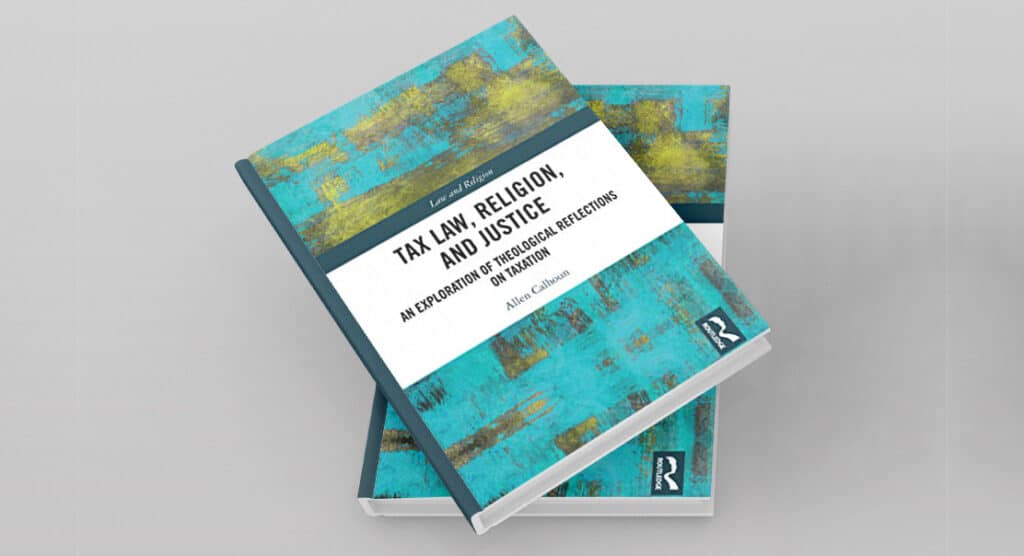Book review: Tax Law, Religion, and Justice

An Exploration of Theological Reflections on Taxation
Allen Calhoun
Published Routledge, 2021, 294 pages, £36.99.
The following article was first featured in the Affinity Social Issues Bulletin (Issue 51 – November 2022). Download the whole issue for free.
Tax Law, Religion, and Justice is by no means an easy read but is an extremely thought-provoking 294-page volume from Dr Allan Calhoun, a McDonald Distinguished Fellow at the Center for the Study of Law and Religion at Emory University, who has previously been a tax lawyer and a tax law editor and who holds several academic qualifications from the UK and the US.
While the title could be interpreted broadly, Calhoun narrows it down at the outset by identifying two competing principles which drive tax policy – equity and efficiency.
He defines ‘equity’ as the principle that the tax system has the potential to redistribute resources within society, while ‘efficiency’ is defined as the principle that tax is a necessary evil, under pressure to limit itself for the sake of economic productivity and efficiency.
Calhoun’s fundamental opening question is:
Why is tax policy driven by the competing principles of equity and efficiency? Underlying this is a further question, being why does taxation serve an adjunct role in legal systems, functioning as the means of achieving redistributive justice while other areas of law protect private property and foster the production of wealth?
The approach taken is historical and theological, going back to the underlying theological concepts which Calhoun believes still affect tax theory today. He explains that: ‘This project accepts the invitation to excavate the theology or theologies that direct taxation towards a redistributive goal not readily explicable by most prevailing theories of tax equity.’
This does seem to contain hints of a predetermined conclusion, although Calhoun recognises some limitations to his study. It is not intended to make detailed policy recommendations to improve the US tax system (the book appears to be primarily aimed at a US readership, although it does contain occasional references to the UK). It does not suggest that current tax policy should be guided by a particular theological doctrine. Finally, Calhoun acknowledges that Medieval and Reformation teaching on taxation does not supply the technical precision needed for developing contemporary tax policies.
Calhoun’s purposes in writing are aimed at three main audiences:
- To the historian, he wishes to explain the ‘ambivalent position’ that tax theory is currently in.
- To the church, he asks believers to consider redistributive taxation as a means of taking on the burdens and needs of neighbours.
- To policymakers, he warns that multiple goals must be taken into account when setting tax policy, not just one goal such as economic growth.
Having thus set the scene, the remainder of the book surveys attitudes to taxation throughout church history and attempts to draw insights and develop principles from the thinking of great theologians from the past, including Thomas Aquinas, William of Ockham, Martin Luther and John Calvin.
Calhoun helpfully summarises his understanding of these attitudes and principles in his final chapter as follows:
The theological history of taxation provides an antidote to the telescoping of ethical commitments in several ways. First, as we saw in the case of Thomas Aquinas, it nuances property rights by subjecting them to the higher demands of necessitas in natural law itself, thus ensuring that the needs of the poor are included in any bargain. Secondly, as in the recessive voice represented by Ockham, theology has the capacity to show that taxation can resolve the conflict between wealth and poverty; taxation can be the means of purifying oneself of the taint of the wealth that originates with Caesar. Thirdly, taxation can form part of the dynamic overflow of good things that characterizes Luther’s theology of the Lord’s Supper. Fourthly, Calvin – taking his cue from Augustine – teaches us that the end-point of all human striving lies with God in the age to come; all we can do in the present age is to respond tentatively and temporarily to injustices and inequalities as they present themselves. One political-theological theme runs through all of these lessons to be learned: at the level of civil government, taxation is a paradigmatic instance of the suture that heals fundamental fractures – i.e., between equality and inequality, between rich and poor, between spiritual and physical needs, between abundance and scarcity, between will and precept, and between individualism and altruism. But that healing is only provisional.
There is a strong emphasis throughout on the use of the tax system to redistribute wealth between the rich and the poor. Calhoun’s conclusion is essentially a call to return tax policy to what he views as its original theological context and to see it as a tool to bring about human solidarity and as a vehicle for:
Accommodating the needs that all of society’s members have to a subsistence minimum, the need of society’s members to retain enough of their material resources to work productively, and the needs of the government to create and maintain the conditions necessary for both of the other sets of needs.
Overall, Calhoun is to be highly commended for addressing the issue of taxation in a theological and historical context and his work provides valuable grist to the mill for any Christians who are seeking to think through the issue of taxation from a theological perspective. There is an inclination in some Christian circles to view taxation as falling within a secular sphere to which theology has little relevance and Calhoun’s work does much to redress the balance and to show that it is an issue on which theologians from the past have not been silent. As will be seen from later comments, whether Calhoun correctly identifies the original theological context and purposes of taxation within both the biblical and historic theological tradition is another matter.
Comments made by Calhoun on the place of providence and eschatology in Calvin’s social and economic understanding are also helpful to Christians who are seeking to address issues relating to wealth and poverty in a world that groans for renewal. Ultimately, Calhoun views Calvin as maintaining the existence of a ‘symbiotic relationship’ between rich and poor, with the rich having a responsibility to distribute what has been given to them on trust from God and the poor having a responsibility to gather it in. Ongoing unity and mutual cooperation between rich and poor, rather than the total elimination of inequality, is to be seen as the goal. Calvin’s eschatology is significant here in that he makes a clear distinction between the present fallen age (where the poor will always be with us) and the restored age to come (in which all wrongs will be righted and injustices settled). In direct contrast to the modern God-rejecting understanding which requires all inequalities to be resolved in the present age, Calvin was able to trust God to provide a final resolution on the day of judgement, while at the same time seeking the good of others as part of an ongoing process of meeting their needs.
Despite these strong positives, Calhoun has particular personal leanings and it may be helpful to highlight some areas where these show through:
Redistribution of wealth
There appears to be an assumption throughout the book that the principle of achieving equity and the redistribution of wealth via the tax system is a good thing. Indeed, Calhoun comments in his introductory chapter:
The theologians discussed herein never questioned a ruler’s prerogative to raise revenue for the common good, as long as the revenue raised was indeed used for the common good. What the theologians required was that the ruler’s objectives be infused with concern for the needs of society’s disadvantaged members.
As can be seen from the reflections in the point below, the accuracy of this statement is perhaps questionable, but even if it were entirely correct, it would have been helpful to see Calhoun acknowledging and providing support for his fundamental assumption and perhaps taking into account the views of theologians of differing persuasions. One might add that the biblical witness principally sees taxation as raising revenue for a particular need and that most taxation in the Bible is either a flat rate or an indirect tax on items, neither of which is especially redistributive in themselves.
Interaction of different spheres within society
Limited attention is given to the respective roles and responsibilities of different elements within society, including the state, church, local community and family. Although not part of the primary scope of the book, establishing the role of each party and how these are defined and limited is essential to an understanding of where the state should be focussing its attention and what taxing rights it should have.
There remains significant scope for further study in this area, including the extent to which there is the potential for the state to cause greater harm than good if it oversteps its boundaries and becomes involved in areas of welfare which are (or should be) primarily the responsibility of the family, local community or church.
Privately funded versus state-funded welfare
In some areas, Calhoun fails to distinguish adequately between privately funded welfare and state-funded welfare. This particularly manifests itself in the chapter on Calvin, where he does not make clear how the Genevan welfare system was funded. While he does acknowledge that the French refugee centre was privately funded, he does not consider the reasons for this or make a clear distinction between privately and publicly funded institutions when drawing lessons from Calvin’s Geneva. The church also appears to have had some involvement, but again Calhoun does not fully address the specifics of how the roles of church and state interacted and the reasons behind this.
A deeper understanding of these points would be required to draw valid lessons from the provision of welfare in Calvin’s Geneva.
Applying a constructive interpretation to theologians of the past
At points, Calhoun openly interprets theologians of the past in light of his preference for a redistributive model of taxation. For example, in the chapter on Aquinas, he writes:
Why is all of this not merely an argument for taxation? Why does taxation, a kind of licit robbery by public authority, even enter Thomas’ moral vision of the community of goods that circumscribes individual appropriation?
In response to his own questions, Calhoun accepts that ‘no explicit grounds for the redistribution of resources can be located in Thomas’ writings’. However, he takes a constructive approach by ‘developing principles that are implicit in Thomas’ thought’ in order to reach a conclusion that favours the redistribution of wealth via the tax system.
In the chapter on Calvin, Calhoun comments:
One might be tempted to conclude that Calvinism bequeathed an emphasis on voluntary charity as the primary form of poor relief to the societies that embraced a certain reading of Calvin’s insistence on the church’s autonomy, while social welfare in Lutheran states centred on government-administered systems of redistributive taxation. However, the separation of functions in Calvin’s theology must not be overstated….
He subsequently says that:
Far from relegating poor relief to the realm of optional personal choice, Calvin raised it to the level of a special task of the church and one that the civil government was obliged to support. It was a point of overlap between the kingdoms.
Unfortunately, Calhoun does not provide examples of how the civil government was obliged to support poor relief in Calvin’s Geneva and whether such support took the form of funding which was raised via the tax system or whether it was primarily shown in other ways.
As he concludes his section on Calvin, Calhoun comments: ‘Thus, in a very general sense, Calvin lands in the tradition of thinkers who view taxation as an instrument of balancing social goods.’
The reference to ‘a very general sense’ could be interpreted as an acknowledgement that there appears to be weak support for Calvin being in favour of the use of the tax system for the redistribution of wealth (presumably if there were stronger support then Calhoun would have referred to it), which suggests that a constructive approach may also have been applied here. For Calvin, like others, the church’s responsibility for social welfare (administered by the deacons) was significant. Whilst not excluding some central provision (which the city council achieved via the hospital), the essential role of civil government was law and order (the restraint of wickedness). Work itself was endowed by Calvin with moral purpose and dignity. None of this implies particularly strong support for the principles of redistribution.
While there is a place for drawing principles from and building on the work of theologians of the past, the danger of a constructive approach is that it can lead to an interpretation that favours our pre-existing ideology. Further investigation is needed into the reasons why both Aquinas and Calvin stopped short of full support for a redistributive model of taxation and into the place of private charity versus state-funded welfare in Calvin’s thinking.
As a result of these limitations, Calhoun’s conclusions cannot be endorsed and there remains much work to be done to develop a fully worked-through theological approach to tax policy. However, his book is certainly recommended as a stimulating resource for the informed reader who is seeking to engage with tax policy issues from a theological and historical perspective. As has been highlighted throughout, there is substantial scope for further research and Calhoun’s volume paves the way for others to follow in due course.
Naomi Wells works as a private client tax partner at Azets, a top-10 accountancy firm, and is a member of the International Presbyterian Church in Ealing. All views expressed are her own.

Related articles
Stay connected with our monthly update
Sign up to receive the latest news from Affinity and our members, delivered straight to your inbox once a month.



